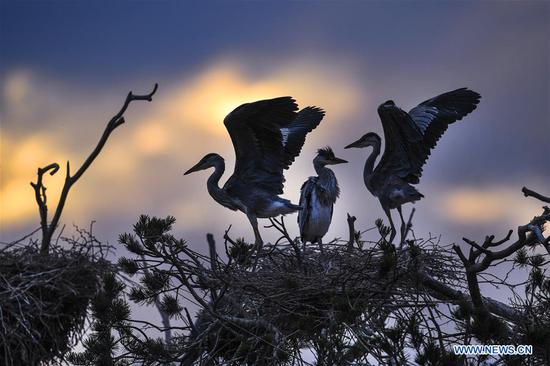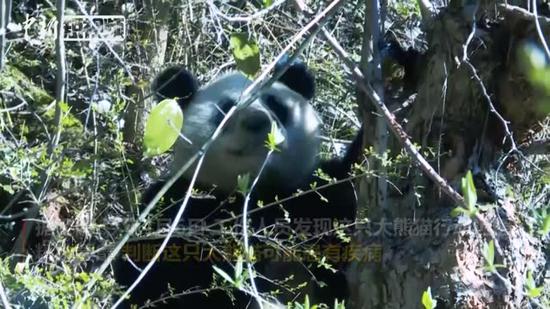
The Artemisia Annua Germplasm Resources Bank in Rong'an County, Southwest China's Guangxi Zhuang Autonomous Region, June 17, 2019. The facility is home to more than 1,000 types of Artemisia Annua, or sweet wormwood, a herb employed in Chinese traditional medicine. The plant seeds are stored at temperatures of minus 80 degrees, minus 25 degrees and room temperature. At the facility, research is underway to better understand seedling cultivation to select the best strain for producing artemisinin, a substance that inhibits the malaria parasite and discovered by Tu Youyou, who won the 2015 Nobel Prize. The facility is also the world's largest producer of artemisinin. (China News Service/Wang Yizhao)

The Artemisia Annua Germplasm Resources Bank in Rong'an County, Southwest China's Guangxi Zhuang Autonomous Region, June 17, 2019. The facility is home to more than 1,000 types of Artemisia Annua, or sweet wormwood, a herb employed in Chinese traditional medicine. The plant seeds are stored at temperatures of minus 80 degrees, minus 25 degrees and room temperature. At the facility, research is underway to better understand seedling cultivation to select the best strain for producing artemisinin, a substance that inhibits the malaria parasite and discovered by Tu Youyou, who won the 2015 Nobel Prize. The facility is also the world's largest producer of artemisinin. (China News Service/Wang Yizhao)

The Artemisia Annua Germplasm Resources Bank in Rong'an County, Southwest China's Guangxi Zhuang Autonomous Region, June 17, 2019. The facility is home to more than 1,000 types of Artemisia Annua, or sweet wormwood, a herb employed in Chinese traditional medicine. The plant seeds are stored at temperatures of minus 80 degrees, minus 25 degrees and room temperature. At the facility, research is underway to better understand seedling cultivation to select the best strain for producing artemisinin, a substance that inhibits the malaria parasite and discovered by Tu Youyou, who won the 2015 Nobel Prize. The facility is also the world's largest producer of artemisinin. (China News Service/Wang Yizhao)

The Artemisia Annua Germplasm Resources Bank in Rong'an County, Southwest China's Guangxi Zhuang Autonomous Region, June 17, 2019. The facility is home to more than 1,000 types of Artemisia Annua, or sweet wormwood, a herb employed in Chinese traditional medicine. The plant seeds are stored at temperatures of minus 80 degrees, minus 25 degrees and room temperature. At the facility, research is underway to better understand seedling cultivation to select the best strain for producing artemisinin, a substance that inhibits the malaria parasite and discovered by Tu Youyou, who won the 2015 Nobel Prize. The facility is also the world's largest producer of artemisinin. (China News Service/Wang Yizhao)

The Artemisia Annua Germplasm Resources Bank in Rong'an County, Southwest China's Guangxi Zhuang Autonomous Region, June 17, 2019. The facility is home to more than 1,000 types of Artemisia Annua, or sweet wormwood, a herb employed in Chinese traditional medicine. The plant seeds are stored at temperatures of minus 80 degrees, minus 25 degrees and room temperature. At the facility, research is underway to better understand seedling cultivation to select the best strain for producing artemisinin, a substance that inhibits the malaria parasite and discovered by Tu Youyou, who won the 2015 Nobel Prize. The facility is also the world's largest producer of artemisinin. (China News Service/Wang Yizhao)

The Artemisia Annua Germplasm Resources Bank in Rong'an County, Southwest China's Guangxi Zhuang Autonomous Region, June 17, 2019. The facility is home to more than 1,000 types of Artemisia Annua, or sweet wormwood, a herb employed in Chinese traditional medicine. The plant seeds are stored at temperatures of minus 80 degrees, minus 25 degrees and room temperature. At the facility, research is underway to better understand seedling cultivation to select the best strain for producing artemisinin, a substance that inhibits the malaria parasite and discovered by Tu Youyou, who won the 2015 Nobel Prize. The facility is also the world's largest producer of artemisinin. (China News Service/Wang Yizhao)

The Artemisia Annua Germplasm Resources Bank in Rong'an County, Southwest China's Guangxi Zhuang Autonomous Region, June 17, 2019. The facility is home to more than 1,000 types of Artemisia Annua, or sweet wormwood, a herb employed in Chinese traditional medicine. The plant seeds are stored at temperatures of minus 80 degrees, minus 25 degrees and room temperature. At the facility, research is underway to better understand seedling cultivation to select the best strain for producing artemisinin, a substance that inhibits the malaria parasite and discovered by Tu Youyou, who won the 2015 Nobel Prize. The facility is also the world's largest producer of artemisinin. (China News Service/Wang Yizhao)

The Artemisia Annua Germplasm Resources Bank in Rong'an County, Southwest China's Guangxi Zhuang Autonomous Region, June 17, 2019. The facility is home to more than 1,000 types of Artemisia Annua, or sweet wormwood, a herb employed in Chinese traditional medicine. The plant seeds are stored at temperatures of minus 80 degrees, minus 25 degrees and room temperature. At the facility, research is underway to better understand seedling cultivation to select the best strain for producing artemisinin, a substance that inhibits the malaria parasite and discovered by Tu Youyou, who won the 2015 Nobel Prize. The facility is also the world's largest producer of artemisinin. (China News Service/Wang Yizhao)

The Artemisia Annua Germplasm Resources Bank in Rong'an County, Southwest China's Guangxi Zhuang Autonomous Region, June 17, 2019. The facility is home to more than 1,000 types of Artemisia Annua, or sweet wormwood, a herb employed in Chinese traditional medicine. The plant seeds are stored at temperatures of minus 80 degrees, minus 25 degrees and room temperature. At the facility, research is underway to better understand seedling cultivation to select the best strain for producing artemisinin, a substance that inhibits the malaria parasite and discovered by Tu Youyou, who won the 2015 Nobel Prize. The facility is also the world's largest producer of artemisinin. (China News Service/Wang Yizhao)





























